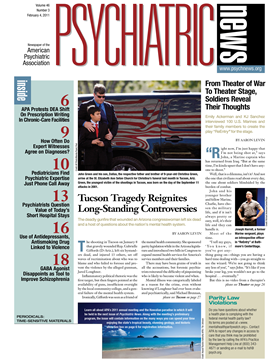As psychiatrists, we see the impact of untreated mental illness and substance use disorders on individuals and their families every day and watch the remarkable change in their lives through treatment. Mental illness is costly not only in human terms, but also in terms of employers' bottom line. Mental illness and substance use disorders annually cost employers an estimated $80 billion to $100 billion in indirect costs alone. More days of work loss and work impairment are caused by mental illness than by other chronic health conditions, including arthritis, asthma, back pain, diabetes, hypertension, or heart disease. Another costly problem is “presenteeism,” when employees are present at work but not productive because of a health issue.
Progressive businesses want better mental health treatment to keep their employees healthy and productive and to keep their family's mental health problems from being a distraction from their workday. As clinicians, psychiatrists can play a critical role in this area. Psychiatrists can also go a step further by collaborating with employers to enhance employees' health and mental health, reducing costs related to lost productivity and employee absences because of mental disorders, and educating employers that effective insurance coverage is a win-win for everyone. That psychiatrists become involved in this effort is even more critical now, as health care reform and the mental health parity law take effect in the United States.
Much as APA's Department of Government Relations works to advocate for psychiatry at the legislative level, the American Psychiatric Foundation has developed an important initiative that advocates for high-quality mental health care with private-sector policymakers and purchasers: our nation's employers. This unique program is called the Partnership for Workplace Mental Health, and it works with businesses to ensure that employees and their families living with mental illness, including substance use disorders, receive effective care. As purchasers of health care for millions of American workers and their families, businesses play a powerful role in what services are reimbursed and therefore, delivered, to our patients. The message of the partnership is simple: investing in a mentally healthy workforce is good for business.
Beginning in 2002, staff began identifying employers that successfully address mental health. It was difficult at times. Being identified as a champion for employee mental health was sometimes seen as a potential corporate liability, rather than an asset. Today, corporate recognition of the prevalence and cost associated with untreated mental illnesses mirrors the public's growing understanding that mental illnesses are real and can be effectively treated. Although stigma persists and hinders access to care, many employers have become leaders in developing workplace programs that promote early identification, intervention, and effective management of mental illnesses.
For example, Caterpillar, based in Peoria, Ill., has nearly 95,000 employees worldwide. The partnership highlighted Caterpillar's work in its publication Mental Health Works. Caterpillar has a long-term, comprehensive approach to its workplace health and productivity strategy, with a strong emphasis on mental health and substance abuse. The company tracks results and is constantly innovating to improve the program. For instance, Caterpillar developed an internal depression management program after discovering that many participants in its diabetes program struggled with comorbid depression. Caterpillar understood that diabetes can't be effectively addressed if comorbid depression is ignored.
Currently, the partnership is involved in the critical mission of helping employers implement the historic changes heralded by health care reform and parity. Nearly 100 employer inquiries are fielded each month on a range of topics related to designing and paying for mental health services. Since any single employer can potentially represent thousands of employees and family members, this is a sizeable and influential audience.
The partnership has garnered considerable attention for APA in its efforts for employer outreach, both in print and radio media, and at employer conferences across North America. Employers in your community can benefit from the resources we have developed, and I encourage you to consider how you might be able to help spread the word of their availability. Similarly, if you have personal connections to a business CEO or director of human resources, consider introducing the person to the partnership with its online resources. Those of you employed in systems of care can bring these resources to the attention of your HR personnel. Through these efforts, each of us can contribute to improving access to mental health and substance abuse treatment for all Americans, as well as strengthening our workforce.
For more information about the Partnership for Workplace Mental Health, please go to <
www.workplacementalhealth.org>. I hope you will get involved in this important work.


